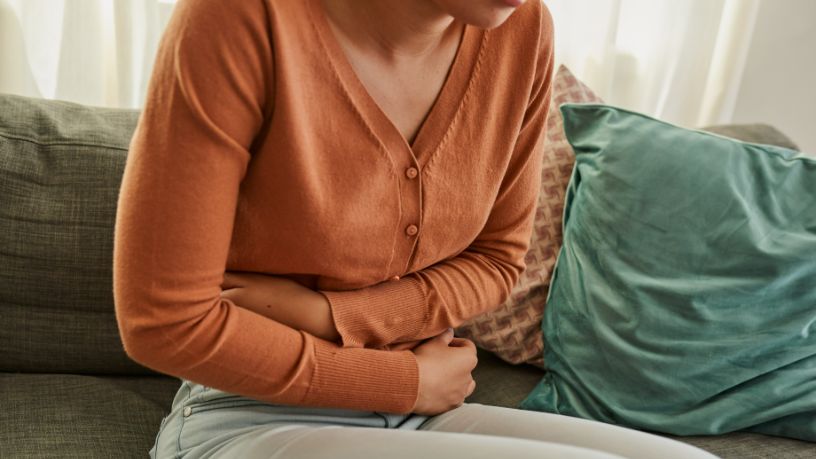Early detection for bowel cancer is crucial in making sure the disease does not progress or spread.
Key takeaways
If you’re aged between 45 and 74, you may be eligible to receive a free at-home bowel cancer screening test every 2 years. This test saves lives, including Jenny’s.
Read about Jenny’s life-changing cancer experience.
The blue and white testing kit that was sent to Jenny Prowse collected dust inside her Paynesville home for 6 months before she finally opened it.
A healthy 58-year-old with no symptoms and no family history, Jenny wasn’t in a hurry to do a bowel cancer test. Even after she eventually did, and later received a letter telling her there were some abnormalities, she still didn’t strongly consider the possibility.
“I went to see my GP and he said ‘it’s probably nothing, but we’ll get you in to have a colonoscopy,’” Jenny recalls.
“I woke up from the colonoscopy with a nurse holding my hand, telling me that my husband was on his way, and the surgeon at the bottom of my bed looking at me. I said, ‘it's cancer, isn't it?’ And he said, ‘yes.’"
Jenny was sent to Melbourne to see a specialist. He recommended another colonoscopy and more tests to understand the size of the tumour.
Bupa Health Programs
Discover our programs designed to help you recover and stay out of hospital where you can.
When she woke up after the second procedure, her surgeon told her she needed an ileostomy, a surgery to remove part of her bowel and rewire it through a stoma, a hole in the abdomen. The idea was to relieve the blockage, protect the bowel and let it heal. It would be reversed once the tumour was removed.
“That was a shock,” says Jenny. “I went from using my bowels normally every day to having a stoma bag within 24 hours.”
Soon after, she started chemotherapy and radiation to shrink the tumour, which was about 7 centimetres large.
“Every day I had treatment, I got up and had my chemotherapy tablets,” says Jenny. “Then I’d put my makeup and a pretty dress on, do my hair and make an effort to feel nice before heading in for radiation. Afterwards I’d take it all off and go to bed for a couple of hours.”
For me, it was about keeping my mind positive. Thinking, ‘it is what it is, so let's be the best we can be, the strongest we can be, and get it done.’
Bowel cancer and Australia
Bowel or colorectal cancer affects one in 16 Australians, with more than 14,000 people diagnosed every year. It’s also the nation’s second deadliest cancer and, sadly, one third of those diagnosed don’t survive.1
Thankfully, Jenny’s tumour was successfully removed and she’s now cancer-free.
“The cancer wasn’t in my lymph nodes, so I’m extremely lucky,” she says. “It was picked up and treated at the earliest possible stage.”
Jenny didn’t actively seek out the bowel cancer test. It was provided to her by the National Bowel Cancer Screening Program, which sends out a free at-home immunochemical faecal occult blood test (iFOBT) every 2 years to eligible people aged between 50 and 74. People aged 45 to 49 years are also able to participate in the program and can request a kit by contacting the National Bowel Cancer Screening Program.
Once you’ve taken the test, you can mail it to the program’s pathology lab in a reply paid envelope. The results will be sent to you and your doctor within 4 weeks.
“I was getting my flu shot the other day and I was talking to the nurse,” says Jenny. “She asked how they found the cancer and I told her about the test I got in the mail. The nurse said, ‘I have one sitting at home that I haven’t done. I’m going to do it now.’”
While bowel cancer affects men and women almost equally,1 women are often reluctant to get tested for it because of the misconception that it mostly affects men. A myth Jenny is doing her best to change.
“As a survivor of bowel cancer, I tell everyone: ‘Do the test, don’t wait, when you get it just do it,’” says Jenny. “We’re lucky in Australia to have this sent to us free. You can also grab one from the GP or buy it from the chemist.”
“It's an easy test to do. It’s not messy and you only need a small sample,” she adds. “Bowel cancer treatment has come a long way, but early detection is so important.”
Resources
The National Bowel Cancer Screening Program provides information and resources, including free screening kits to eligible Australians.
Bowel Cancer Australia offers support online or over the phone on 1800 727 336.
Cancer Council offers resources online and over the phone on 13 11 20.

At Bupa, trust is everything
Our health and wellbeing information is regularly reviewed and maintained by a team of healthcare experts, to ensure its relevancy and accuracy. Everyone's health journey is unique and health outcomes vary from person to person.
This content is not a replacement for personalised and specific medical, healthcare, or other professional advice. If you have concerns about your health, see your doctor or other health professional.
1Bowel Cancer Australia. (2024). Bowel Cancer Facts. Bowel Cancer Australia.
You might also like...
What your poo says about your health
The key to understanding your gut health may be easier than you think. All you need to do is check before you flush.
Emily’s story: From cancer survivor to entrepreneur and mother
Emily kicked cancer 3 times. Through her experience, she was inspired to start a business and was given an unexpected miracle. Read about her journey.
Colonoscopy
A colonoscopy is performed to investigate symptoms that affect your bowel. So, how does it work, and what should you expect if you’re having one?
Irritable bowel syndrome (IBS): The basics
IBS is a gut disorder that can include symptoms like diarrhoea, bloating and abdominal pain. Find out about the symptoms and how you can get diagnosed.





